Praise for The Trauma of Doctrine
We might think challenging spiritual abuse is a recent phenomenon in the church were it not the practice of Christianitys founder before his death. So this underdeveloped topic warrants much more investigation. Maxwells contribution to a theology of trauma in a religious context is disturbing and profound, demonstrating a radical fidelity to Christian orthodoxy and a ruthlessly honest engagement with the Bible, the Reformed tradition, and elements of contemporary neo-Calvinism. Its autobiographical pathos should enable readers to overlook those places where they disagree in order to receive its remarkable insights, sensing they were forged through immense suffering. And may this book help those of us in the Reformed tradition to better serve the traumatized by identifying and removing those elements that are among the stumbling blocks to faith of which Christ spoke (Mt 18:610).
Eric L. Johnson , professor of Christian Psychology, Gideon Institute of Christian Psychology and Counseling, Houston Baptist University
In The Trauma of Doctrine , Paul Maxwell has woven a rich tapestry using theology, philosophy, and trauma theory. Focusing on the intersection of faith and trauma, he interrogates some standard claims of Reformed theology, and finds them wanting. With a nose for creedal inconsistency, theological dissonance, and shallow anthropology, Maxwell addresses the traumatized and spiritually frightened who are, nonetheless, starved for the embrace of an affectable God willing to help my unbelief. I found his exploration of the wounded imagination and the role of liturgy in healing to be rather refreshing. Serious students of these disciplines cannot afford to ignore this mature study.
Andrew J. Schmutzer , professor of Biblical Studies at Moody Bible Institute and coauthor of Between Pain & Grace: A Biblical Theology of Suffering .
Pastors and theologians need to read Paul Maxwells book, for the ranks of the traumatized are growing, and all too often neither the church nor our theology provide a hospitable place for understanding their experience.... [H]e takes the road less traveled toward spiritual recovery, retrieving properly Reformed resources to deal with a problem generated by Reformed theology itself. Maxwell has written... a reflection like no other on the awful, sovereign grace of God.
Kevin J. Vanhoozer , Research Professor of Systematic Theology at Trinity Evangelical Divinity School
Paul Maxwells work speaks powerfully to the fact that theology is always historically, culturally, and personally situated. Reformed theology is no different. Calvins answers to the questions of his day, as compelling as they are to some, are not necessarily helpful to othersparticularly the traumatizedat least when stated in maximalist abstract terms. But Maxwell offers more than a critique. He suggests theological pathways to resilient faith. Theologians, scholars, Christian therapists, and pastors will find his work penetrating and helpful, especially those who hope to minister to sufferers.
Rev. Winston T. Smith , author of Untangling Emotions
Paul Maxwell has brought the topics of trauma and doctrine together in a masterful fashion. Here we encounter a deep understanding of the meaning and function of trauma along with an engagement with the ways Christian beliefs can either thwart or facilitate a path to wholeness. This book is unique, informative, and helpful. The insights and the constructive proposal for the church are not merely interesting but sorely needed.
Vincent Bacote , Director of the Center for Applied Christian Ethics and Associate Professor of Theology at Wheaton College
To the Maxwells
Molly, Barb, Amy, Marty, Walter, and Pepper
The Trauma of Doctrine
New Calvinism, Religious Abuse, and the Experience of God
Paul Maxwell
LEXINGTON BOOKS/FORTRESS ACADEMIC
Lanham Boulder New York London
Published by Lexington Books/Fortress Academic
Lexington Books is an imprint of The Rowman & Littlefield Publishing Group, Inc.
4501 Forbes Boulevard, Suite 200, Lanham, Maryland 20706
www.rowman.com
6 Tinworth Street, London SE11 5AL, United Kingdom
Copyright 2021 The Rowman & Littlefield Publishing Group, Inc.
All rights reserved . No part of this book may be reproduced in any form or by any electronic or mechanical means, including information storage and retrieval systems, without written permission from the publisher, except by a reviewer who may quote passages in a review.
British Library Cataloguing in Publication Information Available
Library of Congress Cataloging-in-Publication Data
Library of Congress Control Number: 2020946285
ISBN 978-1-9787-0423-7 (cloth)
ISBN 978-1-9787-0424-4 (Electronic)
 The paper used in this publication meets the minimum requirements of American National Standard for Information SciencesPermanence of Paper for Printed Library Materials, ANSI/NISO Z39.48-1992.
The paper used in this publication meets the minimum requirements of American National Standard for Information SciencesPermanence of Paper for Printed Library Materials, ANSI/NISO Z39.48-1992.
Contents
This book endeavors into the overlapping areas of psychological trauma and systematic theology by investigating the dynamic interplay between the psychology of holding maximalist theological beliefs and recovery from abuse trauma. In particular, it examines the effect that Calvinist belief can have upon the traumatized Christian who negatively internalizes its superlative doctrines of divine control and human moral corruption. The project undertakes to understand these intersecting realities by investigating a triptych of inquiries: From a theological perspective, can a Christian lose his faith because of a traumatic experience? Moreover, what are the consequences of such a loss? And, how could Reformed theology exacerbate this religious detachment?
I conscript an interdisciplinary approach which seeks always to establish a working middle term between the disciplines of psychology and theology. In addressing Reformed theology, the middle term is the existential problem of evil (part I); when the cognitive structure of religious belief, it is the imagination (part II); when the fortitude of both God and man in the partnership of faithfulness, it is pistic resilience (part III); when the practical recovery of faith after trauma, it is autonomy (part IV).
Ultimately, the research suggests that there are experiential harmonies between the belief in Reformed theology and the experience of trauma, which are neither existentially necessary nor therapeutically negligible rather, they are conceptually likely based on both philosophical analysis and psychological research. The suggested middle terms can serve as process tools for the traumatized Christian to mitigate against the exacerbation of traumatic symptomatologyparticularly as it manifests in religious detachmentwhich are here designed for and designated to the architecture of rehabilitating the imagination through a recovery of autonomy.
This project exists in its present form due to the generous colleagues, friends, and family who gave this manuscript the time, attention, energy, and critique it needed to become what it is.
Thanks to Michael Gibson at Lexington/Fortress Academic for believing in this project. Thanks also to Neil Elliot at Lexington/Fortress Academic for overseeing the review process and bringing this project to the finish line.
My most earnest thanks are due to my doktorvater colleague, hero, shepherd, friend, and the greatest mind of modern evangelical theologyKevin J. Vanhoozer. Kevin, you insisted that this project be excellent. You knew that the crisis at the heart of this topic deserved the excellence yielded by objectivity. It was so clear to me while writing, editing, and revising this project that you were harnessing a deep care and concern for the scope of its theses, the excellence of its argument, the longevity of its central enterprise, and the role it would henceforth have in shaping this conversation about trauma and theology. Thank you for bringing me to TEDS, giving me every opportunity to succeed, and investing yourself in such a controversial and unorthodox project. Since words cannot sufficiently express my gratitude, Ill simply end with this: Thank you for partnering with me to produce a work whose quality aims to match the seriousness of the subject matterI had dreamt of doing my doctorate with you since I read Is There a Meaning in This Text? at age 18, and doing so was a dream come true.

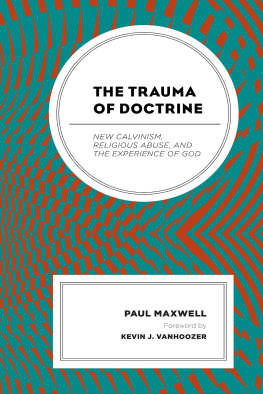

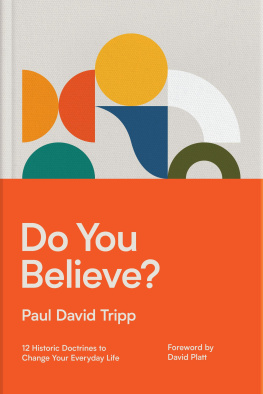

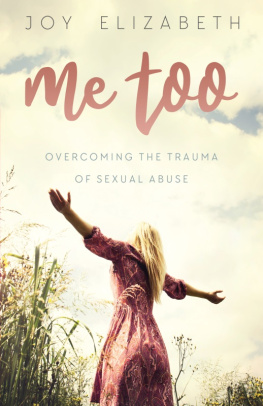
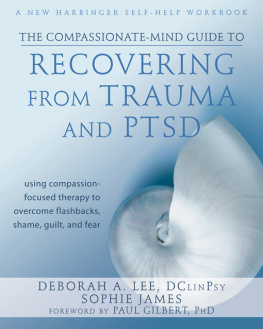
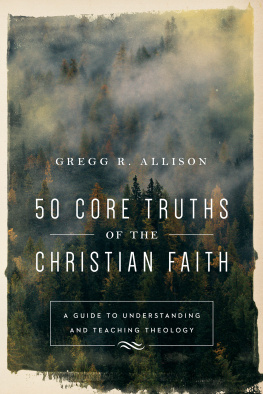
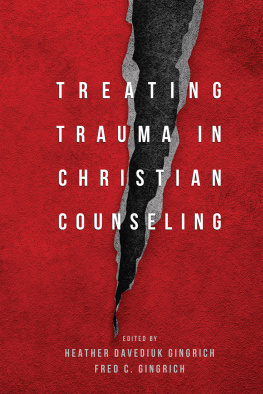

 The paper used in this publication meets the minimum requirements of American National Standard for Information SciencesPermanence of Paper for Printed Library Materials, ANSI/NISO Z39.48-1992.
The paper used in this publication meets the minimum requirements of American National Standard for Information SciencesPermanence of Paper for Printed Library Materials, ANSI/NISO Z39.48-1992.